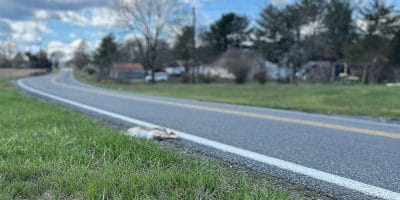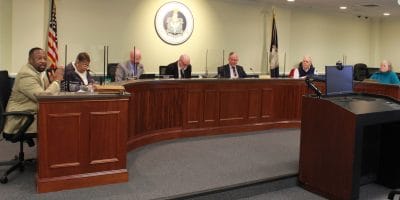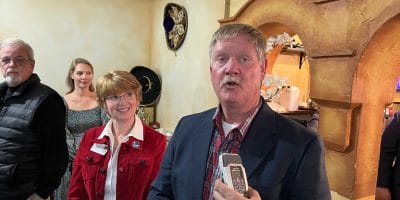By Ryan Alessi
Republican Del. Tony Wilt and his Democratic challenger Brent Finnegan go way back — well beyond the last time they ran against each other in 2017.
Both grew up in Broadway, although in different eras (Wilt is 57, Finnegan is 40). And Finnegan covered Wilt’s first campaign announcement that he would run for the 26th District seat in a 2010 special election, as well as part of that race. At the time, Finnegan was running hburgnews, a local news site he founded four years earlier.
Whether it was their prior connections or personalities, the 2017 race between the two men avoided personal attacks and, instead, focused on key policy differences. It ended with a 10-point win for Wilt in the November Election.
But conditions have changed since that night. As Wilt made his victory speech, many of his Republican colleagues in the House of Delegates were preparing to concede, swept away by a blue wave that crested in Northern Virginia and the stretch between Hampton Roads and Richmond.
Only a name drawing to break a tied race in Newport News kept Wilt and the Republicans in the majority, albeit the slimmest of margins: 51-49.
And since then, Democrats followed up with a strong showing in the 2018 congressional elections, including in the City of Harrisonburg that makes up half of the 26th House district. That has caught the attention of both parties and both candidates, who say they’re taking nothing for granted leading up to the Nov. 5 Election.
“I think it’ll be fairly high on the list,” Wilt said of the race. “In all honestly, look at the last time my opponent ran — he didn’t do terrible. And probably some of the factors that favor him, I don’t know that they’ve diminished.”
Chief among those is the relative influence of Harrisonburg voters, which has been steadily increasing in recent elections.
That started to show two years ago, when Wilt and Finnegan first faced each other. Voters from the 26th District’s county precincts had always outnumbered those from the city’s in previous races, but two years ago, 14 more votes were cast in Harrisonburg than in the county.
Then, last fall, Democratic U.S. Sen. Tim Kaine — buoyed largely by strong support in the city precincts — garnered more votes in the 26th House District than his Republican challenger, Corey Stewart. That has given local Democrats hope that they could flip a district that has been represented by a Republican since this iteration of the district was created after the 2000 U.S. Census.
“This is absolutely a winnable district,” said Finnegan, who won the June 11 Democratic primary with 66 percent of the vote. “The question is: Will we be able to reach out to folks who don’t typically vote in off-year elections? That is our challenge.”
To do so will require connecting with people who might not be considered the typical or likely voters, he added.
“Our focus is to reach out to folks who have given up hope in our democratic system — people who, when I knock on their door, say ‘Yeah, I used to vote but it doesn’t really matter’,” Finnegan said.
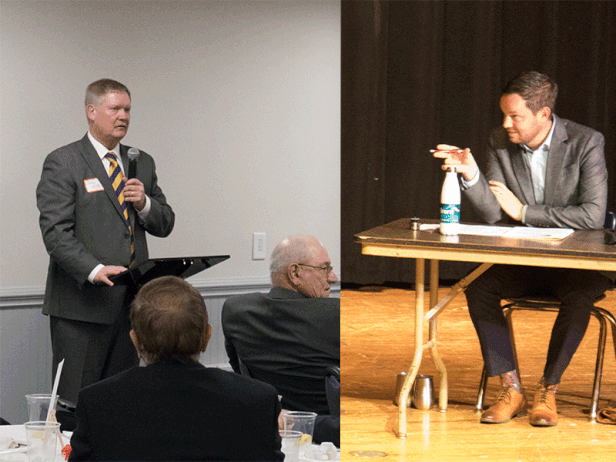
Republican Del. Tony Wilt (left) is facing a challenge from Democrat Brent Finnegan (right) in the 26th House of Delegates district for the second time.
Drawing a contrast
During the 2017 race, Wilt and Finnegan split over many of the issues that typically divide Republican and Democratic candidates for the state legislature, such as whether to expand Medicaid as part of the Affordable Care Act (which the General Assembly ultimately did last year), abortion and reproductive rights and the best way for government to encourage economic growth.
Expect those — and similar —issues to again separate the two. But this time, both men have a better idea of what to expect from each other and of what voters want to know.
Finnegan said campaign fundraising is a key example of the philosophical difference between the two.
Finnegan said he’s focusing on raising money from individuals and wants to avoid any perception that he is beholden to special interests — companies or industry groups that often give political donations through political action committees, or PACs.
While Finnegan said he hasn’t taken a “No PAC pledge,” he said he’s carefully vetting every donation and has turned away at least one because he was concerned about the precedent it set.
“Take the Virginia Industrial Hemp Coalition, for example. I support them. I welcome their support,” he said. “But if I take money from one industry group, what’s to stop me from taking another and another. That’s a big part of what’s wrong with American politics.”
Finnegan said he disagrees with Wilt’s efforts to pass legislation blocking the city of Harrisonburg from enforcing an ordinance preventing mulch from being up against apartment buildings. The issue came up again after a Southview Apartments building burned down in March, killing a cat and leaving dozens of college students homeless, even though mulch wasn’t related to the fire’s cause. Finnegan said it looks bad that Wilt has accepted money from rental company groups.
Wilt received $3,750 from the Apartment and Office Building Association and $2,250 from the Virginia Apartment Management Association over the last nine years, according to the Virginia Public Access Project’s fundraising database.
“That’s putting industry groups over the safety of people who live in the district,” Finnegan said.
Wilt bristles at the notion that any contribution would affect his decisions or votes.
“That whole argument, I think, is unfounded,” he said. “The premise of that whole conversation is that if you take money from an entity and then you cast a vote that favors that entity, then you’ve been bought.”
Wilt said he weighs each issue — and every vote — on its own merits and listens to the testimony.
In a wide-ranging interview with The Citizen, Wilt was careful never to mention Finnegan by name, a common strategy for candidates to avoid boosting their opponents’ name recognition. But Wilt said he was appreciative of the tone of the 2017 race and hopes that’s repeated this fall.
“I complimented my opponent last time. He ran a good campaign — good, as in not negative,” Wilt said. “I expect him to call me on out votes I’ve taken and policy positions, absolutely.”
Wilt said he will continue to stress to voters that there’s no substitute for experience. And, having served more than four full terms since his special election win in 2010, Wilt said he’s developed the understanding, connections and clout to be an effective lawmaker. The day after the interview with The Citizen, Wilt announced he would be on the I-81 Committee, a group charged with guiding the prioritization of improvements to the interstate using dedicated funding, including a gas tax increase soon to take effect along the I-81 corridor.
But he said he also expects the opportunity to press Finnegan on some of his proposals and force his challenger to explain how he plans to execute some of the ideas on which he’s campaigning.
“I hope that the citizens are engaged and they look at each candidate on the issues,” Wilt said. “What are the solid answers?”
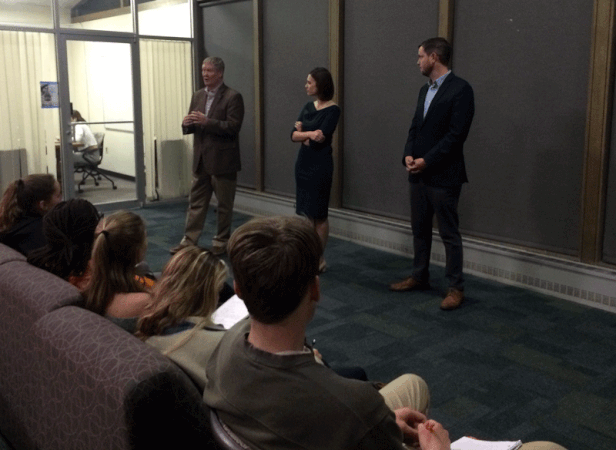
Wilt, left, and Finnegan, right, and Cathy Copeland discussed legislative issues at a traveling town hall event at JMU in March. Finnegan won the Democratic nomination after facing Copeland in the primary.
It’s the economy …
Wilt and Finnegan both aim to connect with people over pocketbook issues. And they agree that many in the 26th District are struggling to make ends meet, even if they have a job — or two.
“We have a 2 percent unemployment rate. That’s not a bad economy,” Wilt said. “That’s a strong, vibrant economy.”
For those who “are not making the wages they’d like,” Wilt said he’d like to encourage more people to take advantage of education programs, such as those at Massanutten Technical Center or Blue Ridge Community College.
Finnegan said “underemployment” — people who are working multiple jobs just to make ends meet or living in crowded apartments or crashing on couches of family and friends even while holding — is his major concern. And while addressing that would require attacking problems, such as availability of affordable housing and health care costs, he said raising the minimum wage in Virginia should be the starting point.
“My primary focus would be making these corporate chains pay their fair share,” Finnegan said.
Wilt, who runs Superior Concrete, his family’s business in Broadway, said he’s concerned that raising the minimum wage would stymie small business by scaring some away from starting companies if employment costs swell or making them less competitive against bigger companies better able to pay higher wages. Even if a wage increase is phased in, it could still harm start-ups and mom-and-pop operations, he said.
“If the job market is there and there’s an opportunity, they’ll go to the employer who’s paying the higher wages,” Wilt said. “That’s how small businesses will be hurt by this.”
On the campaign trail this spring, Finnegan often lamented the changing face of small-town retail, pointing out as an example that Broadway used to have two locally-owned grocery stores. Both are gone and have been replaced with Dollar Stores. He calls it the “cannibalization of small-town America.”
As a way to stem that trend, Finnegan pointed to programs in other states. For instance, the Pennsylvania Fresh Food Financing Initiative from 2004-2010 was a public-private partnership that provided resources to attract grocery stores to communities.
He said the state government should look for ways to spur local businesses, as opposed to throwing hundreds of millions of dollars in tax breaks toward big companies, like it did to attract Amazon’s headquarters to Northern Virginia.
“Most of the local jobs are created by local businesses,” he said. “The principle is called economic gardening.”
He said the effect of large corporations isn’t just affecting the local retail market but is playing out in one of the biggest industries in the Valley: the poultry industry. As more national and internationally owned companies impose restrictions and requirements on poultry farmers, it becomes difficult for area farmers to keep up, he said.
“The corporate oligarchy has taken control of our economy,” Finnegan said. “That may sound like some kind of soundbite, but what that looks like is people I went to high school with who grew up on a poultry farm, had to sell their poultry farm.”
Next stop: special session
But before the fall campaign really gets going, political attention will turn to Richmond for the July 9 special session Gov. Ralph Northam called to address further gun regulations. Northam wants legislators to approve a series of changes, including requiring background checks for anyone who purchases a gun.
Wilt said in a lengthy phone interview last week that he doesn’t have any details about specific proposals but will weigh each bill “on its merits.”
“We are all heartbroken by these tragedies, but at the end of the day, the citizens, I think, expect us to a large degree to put our emotions aside,” he said.
In terms of universal background checks, he said he’s “certainly open to it” but isn’t yet convinced.
“How would this have stopped the tragedy at Virginia Beach?” he asked, referring to the May 31 shooting at the Virginia Beach Municipal Center in which a gunman killed 12 people. “I’m not going to commit one way or the other unless I’ve heard the testimony.”
Finnegan said he not only supports universal background checks but added that he’s baffled why Wilt wouldn’t commit to it.
“That is a commonsense law that should be in every state. If Republicans are not even willing to do that, I don’t know,” he said as his voice trailed off. “I think there are more people who are realizing it’s absurd that we’re forcing children to go through active shooter drills in schools instead of commonsense gun laws that will protect their safety.”
He said he’s frustrated that Republicans, led by House Speaker Kirk Cox, have proposed mandatory minimum sentencing as a condition for gun-related offenses. Northam and Democratic lawmakers have said that’s a nonstarter for them because they say it disproportionally affects people of color accused of crimes.
“It sounds to me like Speaker Cox is trying to ensure that the special session is ineffective,” Finnegan said.
Where the 26th fits in
With control of the House at stake, both statewide parties are expected to be closely monitoring how the race develops. It’s not clear yet in which tier of competitive races the 26th District will be, especially with 69 contested races this year. Of those, 63 districts feature Republican and Democratic candidates — the most in recent years.
The parties, though, are staying quiet about strategies, such as fundraising or financial support for their respective nominees, or even how competitive they consider the race to be.
The Republican Party of Virginia didn’t answer a request for comment about the 26th District.
And the Democratic Party’s spokesman Jake Rubenstein emailed a brief statement in response to specific questions about the race. It said state Democrats are “incredibly excited” about Finnegan being part of the party’s “winning team we are fielding.”
“He has the passion, the biography and the work ethic to take this seat,” Rubenstein’s statement said.
Democrats have struggled in races outside of Northern Virginia, Richmond and Southeast Virginia. The only state House seats Democrats currently hold beyond those regions are: the 11th in Roanoke; the 12th that covers Blacksburg, Radford and the surrounding counties; and the 57th in Charlottesville.
Although the 26th District is part of a sea of Republican red in the House, Democratic U.S. Sen. Tim Kaine lost every other Shenandoah Valley district in the 2018 U.S. Senate race except for the 26th.
“I absolutely think Brent Finnegan’s campaign, by all rights, is a regional target for progressive and Democratic involvement,” said Alleyn Harned, chairman of the Harrisonburg Democratic Committee. “I see this as the most winnable and flippable district in the Valley.”
Harned said he wouldn’t talk publicly about ongoing conversations with Democratic leaders in Richmond. But ultimately, he said, a lot will be in Finnegan’s hands.
“I see the key strategy in this race,” Harned said, “as being smart leadership from the Finnegan campaign.”
Messages left for the Harrisonburg Republican Committee chairman weren’t returned.
But Alexander Rodriguez, president of the JMU College Republicans, told a crowd of nearly 100 local party activists at this spring’s annual College Republican dinner that mobilizing to re-elect Wilt was the group’s top priority.
And, in a surprise to Wilt, the group presented Wilt at that March dinner with its annual A.R. Pete Giesen Award for his dedication to helping the College Republicans. In fact, Wilt was frequently mentioned by all of the speakers that night — even if the election wasn’t specifically.
Republican U.S. Rep. Ben Cline of Lexington — Wilt’s former colleague in the House of Delegates — began his keynote address by giving nod toward “my friend Tony Wilt, who is doing such a great job in Richmond defending our constitutional rights and liberties in the House.”
Journalism is changing, and that’s why The Citizen is here. We’re independent. We’re local. We pay our contributors, and the money you give goes directly to the reporting. No overhead. No printing costs. Just facts, stories and context. Thanks for your support.


